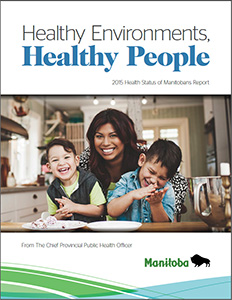 |
Office of the Chief Provincial Public Health Officer
Healthy Environments, Healthy People
 2015 Health Status of Manitobans Report
2015 Health Status of Manitobans Report
Executive Summary
“Those who have health have hope; and those who have hope have everything”. - Adapted from an Arabian proverb
The past 150 years have seen remarkable improvements in health. After centuries of little change, average life expectancy has increased by approximately 30 years – an enormous leap forward. The main drivers of these improvements in health-from improved sanitation, to safer food and workplaces, to reductions in tobacco use-have been the result of advances in public policies that prevent disease and promote health.
This report has been written as a resource for all Manitobans. The aim of this report is to inspire and stimulate thinking and public discussion on how to move towards a Manitoba where more people have greater opportunities to be healthy. The report provides an overall assessment on the current health status of Manitobans, and highlights challenges and opportunities in improving the health and well-being of Manitobans.
Health influences all that we are and all that we do. We must, as a community, be engaged in finding innovative solutions to health challenges. Manitobans are encouraged to explore this report, and act to improve health for all Manitobans.
This report describes the health status of Manitobans through a life stage framework, highlighting key health issues that occur during the different stages of life. These issues can change or evolve at any point, and vary from person to person,depending on physical and social environmental factors.
- Childhood: pregnancy through adolescence
This chapter highlights the importance of nurturing environments – fostered at home, school and in the community – as the foundation for success, health and well-being throughout life. The people, community and circumstances surrounding each child create the environments that can either help or hinder a child’s ability to thrive. This emerging science supports the traditional wisdom that “it takes a (nurturing) village to raise a child”.
Key take-aways:
- At all stages of childhood, children from vulnerable populations are more likely to experience poor health outcomes.
- Safe, stable, nurturing environments can promote healthy child development and can also buffer against the impact of stress and trauma.
- Programs and policies that increase exposures to nurturing environments can improve health and well-being over a lifetime.
- Adults: (ages 18-64)
This chapter highlights how the built environments – the human-made or modified physical surroundings in which people live, work and play – directly impact people’s physical, mental and social health.
Key take-aways:
- More than 80 per cent of adults in Manitoba are estimated to have one or more preventable risk factor(s) for chronic disease. Chronic diseases are complex, and rooted in the broad determinants of health.
- The built environment can positively or negatively influence many aspects of population health, including physical activity, healthy eating, mental health, injury and health equity.
- Older adults: (ages 65 and over)
This chapter highlights the importance of social engagement to promote health. Promoting age-friendly communities and positive attitudes toward aging has benefits for everyone.
- Key take-aways: Social connectedness affects physical and mental well-being.
- Social engagement among older adults:
- enhances life-satisfaction, overall health and wellness
- delays the onset of chronic illness and disability
- aids in the recovery from disability
- is associated with a reduction in mortality
Focus areas:
There are four focus areas within the report, touching on specific background information related to key population health issues, which have implications across the different stages of life.
- First Nation, Metis and Inuit Health: Colonization and Reconciliation – Understanding the history and impacts of colonization on health and well-being.
- Mental Health and well-being: The Foundation of Good Health – Mental health is much more than the absence of mental illness. Taking care of your mental health is just as important as taking care of your physical health.
- The Built Environment – The physical environments around us have significant impacts on our physical and mental health.
- Health Equity: Reducing the Gaps in Health – Differences in socio-economic factors (ex: income, education, employment) significantly impact health in Manitoba, and contribute to the gaps seen between the least healthy and healthiest populations in the province.
Life stories:
Five fictional “life stories” have been included to provide examples that help demonstrate the impact of the determinants of health. The five stories cut across the life stages.
- Amanda (prenatal)
- Maya and Omar (youth)
- Bob (adult)
- Giselle (older adult)
- Jacob (older adult)
How should you use this report?
- THINK about the information presented and about what you can do to improve the health and well-being of Manitobans.
- SHARE and TALK about it with others.
- ACT by doing what you can to make the ideas in this report a reality.
- ENCOURAGE others to act in ways that positively impact the health and well-being of Manitobans.
“Healthy citizens are the greatest asset any country can have.” – Winston Churchill
- Download Healthy Environments, Healthy People
 7.14 Mb | 106 pages
7.14 Mb | 106 pages
For questions or comments about the report, please contact us by e-mail.